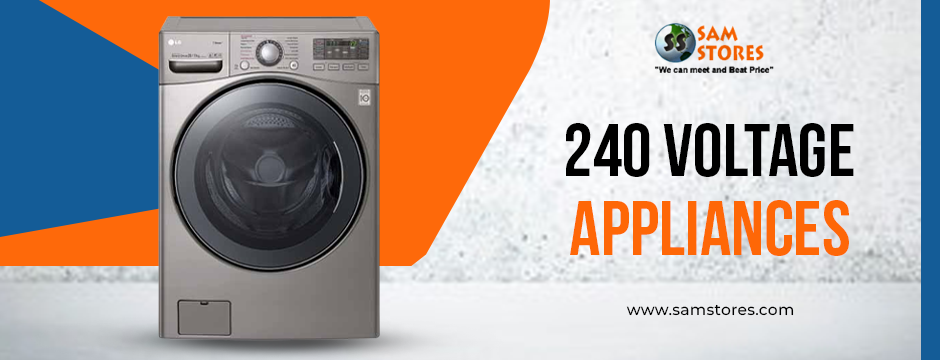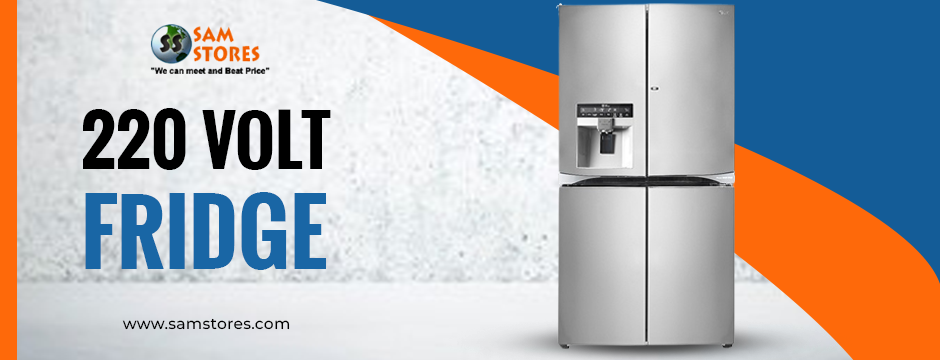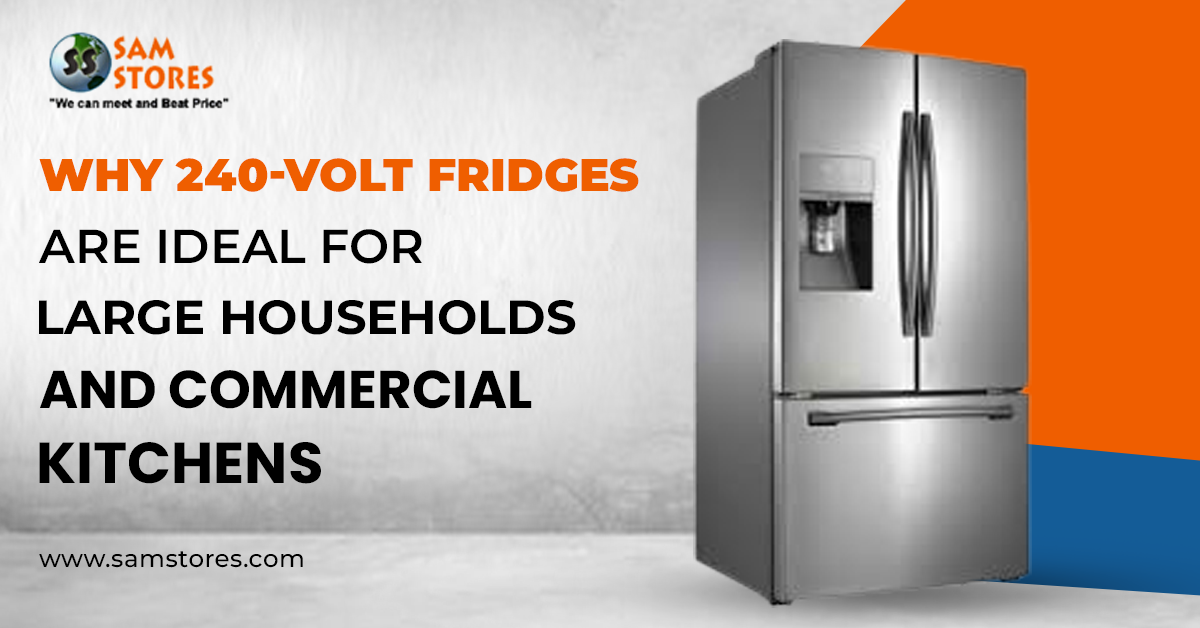Refrigerators are a vital part of both households and commercial kitchens, providing essential storage for perishable goods. As technology continues to evolve, many consumers and businesses are shifting towards more powerful and efficient appliances. One such option that has garnered attention is the 240 volt fridge. While 120 volt fridges are still common in smaller households, the 240 volt models have distinct advantages that make them ideal for larger households and commercial kitchens. This blog will explore why 240-volt refrigerators are superior in certain settings, discussing their energy efficiency, cooling power, capacity, and reliability. We’ll also compare them with traditional 120-volt refrigerators to help you make an informed decision.
Understanding the Difference Between 120-volt and 240 Volt Refrigerators
To grasp why 240 volt refrigerators are better suited for larger households and commercial kitchens, it’s essential first to understand the difference between 120-volt and 240 volt appliances. In the United States, most household appliances operate on 120 volts, which is standard for basic electronic devices. However, larger, high-powered appliances such as ovens, dryers, and refrigerators often require 240 volts to operate efficiently.
The difference lies in the power supply: a 240 volt outlet delivers twice the voltage of a 120-volt outlet. This increased voltage allows for more powerful appliances that can handle greater energy loads, resulting in better performance, especially in larger settings requiring more intensive usage.

Increased Energy Efficiency
One of the primary reasons that 240-volt refrigerators are ideal for large households and commercial kitchens is their energy efficiency. These refrigerators are designed to handle higher loads, which allows them to operate more efficiently when dealing with large volumes of food. In comparison to their 120-volt counterparts, 240 voltage appliances consume less energy relative to the workload they perform.
In a commercial kitchen, where a refrigerator door may be opened frequently throughout the day, maintaining a stable temperature is crucial. A 240-volt fridge is better equipped to quickly cool down after the door is opened, reducing the strain on the compressor and lowering overall energy consumption. This makes them more cost-effective in the long run, particularly in high-demand environments where refrigeration is critical.
For large households that need to store significant amounts of food, a 240-volt refrigerator can help lower energy bills while providing ample storage space. Over time, the initial cost of upgrading to a 240-volt model can be offset by the energy savings.
Superior Cooling Power
Another significant advantage of 240-volt refrigerators is their superior cooling power. These units are built to handle larger volumes of food and can maintain lower temperatures with greater consistency. For commercial kitchens, where food safety regulations are strict and refrigeration must be reliable, this feature is particularly beneficial.
In larger households, a 220 volt fridge can provide better cooling for large quantities of food, ensuring that perishables such as meat, dairy, and produce stay fresher for longer. Because these units can cool down more rapidly and maintain more stable internal temperatures, they are particularly useful for households that buy groceries in bulk or prepare meals in advance.
Commercial kitchens, especially those in restaurants or catering businesses, rely on constant cooling to preserve ingredients and maintain food safety standards. A 220 volt refrigerator’s ability to quickly return to optimal temperatures after frequent door openings reduces the risk of spoilage and keeps food fresh during even the busiest kitchen operations.
Larger Capacity and Storage Options
240-voltage refrigerators are typically larger than standard models, providing more storage capacity for both large households and commercial kitchens. This additional space is a critical advantage when you need to store bulk quantities of food, beverages, or ingredients. In a large household, this can make weekly grocery shopping more manageable, allowing families to store everything from fresh produce to frozen meals without overcrowding the fridge.
In commercial kitchens, having ample storage space is not just convenient—it’s essential for efficient operation. A busy restaurant or catering service requires dedicated space for different types of food, from raw ingredients to prepared dishes. With the extra capacity provided by a 240-volt refrigerator, commercial kitchens can maintain better organization and keep a wider variety of items on hand, improving workflow and reducing the need for multiple refrigeration units.
Many 240-volt refrigerators come with advanced storage options such as adjustable shelves, multiple compartments, and temperature-controlled drawers, allowing for flexible organization and easy access to frequently used items. This versatility is especially beneficial for commercial kitchens that need to store a wide range of perishable goods.
Enhanced Durability and Reliability
A 240-volt refrigerator is built for heavy-duty performance, making it more durable and reliable in high-demand environments. These units are designed to handle frequent usage, making them perfect for both large households and commercial kitchens where the refrigerator is often in constant use.
In a commercial setting, a refrigerator that fails can be catastrophic, leading to spoiled food, lost revenue, and potentially dangerous food safety violations. The higher power output of a 240 volt fridge allows it to work more efficiently under heavy loads, reducing the risk of breakdowns. Many 240-volt models are equipped with commercial-grade compressors and cooling systems, which are built to withstand continuous operation and extended usage.
Large households that require their fridge to handle daily use—especially in homes with multiple people cooking and eating throughout the day—will benefit from the increased reliability of a 240-volt refrigerator. These models are less likely to experience performance issues or malfunctions, ensuring that food remains properly refrigerated at all times.

Faster Recovery Time After Power Loss
Power outages can be problematic for any household or business, but they’re particularly challenging for large families and commercial kitchens where food spoilage is a major concern. One significant benefit of 240-volt refrigerators is their ability to recover faster after a power loss.
Because 240 voltage refrigerators have more powerful compressors, they can quickly return to optimal cooling temperatures once power is restored. This is essential for maintaining food safety, especially in commercial kitchens where the risk of spoilage is high. For large households, this faster recovery time can also help reduce food waste, as the fridge can rapidly cool back down before perishables are affected.
Cost vs. Long-Term Savings
While 240-volt refrigerators are often more expensive upfront than their 120-volt counterparts, they tend to offer long-term savings due to their superior efficiency and reliability. For large households, the ability to store more food and reduce grocery trips can also contribute to cost savings over time. In commercial kitchens, the reduced risk of spoilage, lower energy consumption, and enhanced durability can lead to significant financial benefits.
Though the initial investment may be higher, the long-term advantages of a 240-volt refrigerator make it a wise choice for those looking to enhance their kitchen’s functionality and efficiency.
Bottom Line
For large households and commercial kitchens, a 240 volt fridge offers numerous advantages, from increased energy efficiency and superior cooling power to larger storage capacity and enhanced durability. These refrigerators are designed to handle the demands of busy environments, making them a perfect choice for those who need reliable, high-performance appliances.If you’re looking to upgrade your dream home, you must visit our website SamStores, and consider the long-term benefits of investing in 240 voltage appliances. These appliances help you save energy and reduce costs. Visit us now!
